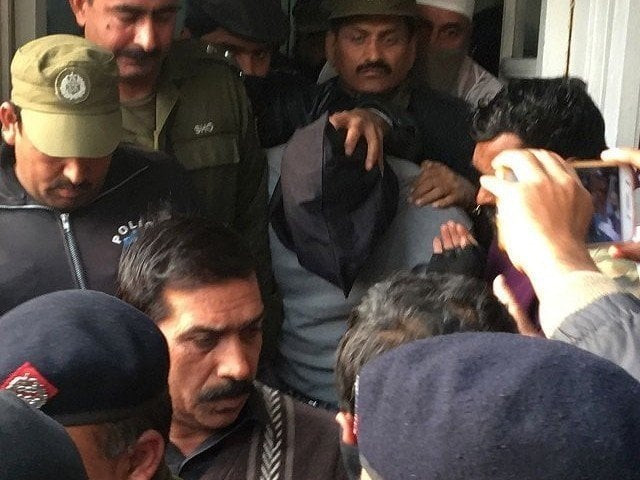Top court throws out Zainab murder-rape convict Imran Ali's appeal
Minor's father reiterates demand for the public hanging of serial rapist

Imran Ali. PHOTO: AFP
The Supreme Court’s three-judge bench, headed by Justice Asif Saeed Khosa and comprising Justice Manzoor Ahmad Malik and Justice Syed Mansoor Ali Shah, heard an appeal filed by Imran against his convictions by the Lahore High Court (LHC).
Rejecting the appeal, the bench noted that the crimes committed by the convict against the child ‘are absolutely horrendous and barbaric’.
The judgement authored by Justice Khosa read, “The petitioner had not only deceitfully kidnapped her but had also brutalised her by committing sodomy and rape with her and had then ultimately killed her mercilessly.
ATC announces death sentence on four counts to culprit in Zainab rape, murder case
“In his pleading guilty to the charge as well as in his statement recorded under section 342 CrPC, the petitioner had admitted committing similar offences with eight other minor victims.
“The petitioner did not deserve any sympathy in the matter of his sentences. This petition is, therefore, dismissed and leave to appeal is refused.”
Earlier, the bench noted that when the charge was framed by the trial court against Imran, he had pleaded guilty and recorded a detailed confessional statement, in which he had admitted almost all charges against him.
It noted that despite his confessional statement, the trial court had decided to proceed with recording of evidence, and during the trial as many as 32 prosecution witnesses testified and many pieces of evidence were brought on the record.
The court observed that in his statement recorded under section 342 CrPC, the petitioner had once again admitted almost all the vital pieces of evidence produced by the prosecution against him as correct and had once again admitted his guilt unreservedly.
“We have observed that even in his arguments addressed before the trial court, the learned counsel for the petitioner had only prayed for some lenience to be shown to the petitioner in the matter of his sentence and no argument had been advanced before the trial court challenging the merits of the prosecution’s case against the petitioner,” said the court.
It observed that in the memorandum of appeal filed by the petitioner before the LHC once again only lenience in the matter of sentence had been prayed for by the petitioner without questioning his convictions recorded by the trial court.
“It was for the first time during the arguments before the high court that the learned counsel for the petitioner had maintained that admission of guilt by the petitioner before the trial court was a result of coercion but during such arguments he had not provided any detail regarding coercion applied against the petitioner so as to extract a confession,” it added.
The court also said in paragraph No 4 of the memorandum of the present petition, it had been claimed that Imran’s confession was a result of duress and inducement but in paragraph No 10 of this very petition he had, once again, admitted his involvement in the alleged offences in clear and categorical terms.
NADRA has no record of suspects arrested in Zainab rape-murder case
“Apart from pleading guilty to the charge and making a confession by the petitioner there were many pieces of evidence brought on the record by the prosecution which proved every word of the confession to be correct,” it said.
“In that regard we may refer to the CCTV footages, photographs, DNA tests and the medical evidence which had confirmed every aspect of the confession made by the petitioner. All such pieces of evidence have convinced us that the confession made by the petitioner was not only voluntary but also true”.
The court said after proper assessment and evaluation of the evidence available on the record both the courts below had concurred in their conclusion regarding guilt of the petitioner having been proved.
“Upon our own independent evaluation of the evidence available on the record, we have found no occasion to take a view of the matter different from that concurrently taken by the courts below,” the order added.


















COMMENTS
Comments are moderated and generally will be posted if they are on-topic and not abusive.
For more information, please see our Comments FAQ